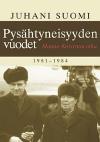 Lauantai
Lauantai
IanMcEwan on kirjailija joka ei fuskaa. Saturdayn jälkisanoissa hän kiittää erityisesti lääkäri Neil Kitcheniä, jonka työtä leikkaussalissa ja muualla hän sai seurata kahden vuoden ajan perehtyäkseen neurokirurgin työhön ja siihen liittyvään käsitteistöön kirjaansa varten, jossa päähenkilö on kuvitteellinen lontoolainen neurokirurgi Henry Perowne. Keskivertolukijan olisi voinut vakuuttaa vähemmänkin perusteellisella erikoisalaan tutustumisella. Minulla ei ole mitään edellytyksiä arvioida sitä kuinka oikein ja pätevästi McEwan aivoleikkauksia ja -sairauksia kuvaa, mutta sen verran vankka hänen maineensa perfektionistina on, että tuskin häntä tähänkään alaan liittyvistä virheistä saadaan kiinni.
Saturday ei tietenkään ole mikään lääkäriromaani, eivätkä jotkut mahdolliset virheet vähentäisi kirjan kaunokirjallisia ansioita sinänsä yhtään. McEwanin tinkimätöntä asennetta fiktionsa faktapohjan pitävyyden varmistamisessa tulee kuitenkin arvostaa. Ainakin itse ärsyynnyn aina, jos muuten hyvä kaunokirjallinen teos sisältää pahoja historiallisia virheitä. Historiallisen ajan ja tapahtumien varma hallinta McEwanin edellisessä kirjassa Atonement teki minuun hyvin positiivisen vaikutuksen.
Tämä on vain reunahuomautus, sillä hyvä kirjallisuus ei tietenkään synny ja elä sen varassa, että kirjailijalla on oikeat ja virheettomät tiedot kuvaamistaan asioista ja ilmiöstä hallussaan. Ylimitoitettu ja hallitsevaan asemaan päästetty detaljitarkkuus voi yhtä lailla jopa tappaa tekstin ja lukunautinnon. Näin McEwanin kanssa ei kuitenkaan mielestäni vielä ole, vaikka ymmärrän että joku voi olla toistakin mieltä. Suvereeni faktahallinta antaa vain rakennusosat muutoin kiehtovalle ja ajatuksia herättävälle monikerroksiselle kerronnalle.
Monikerroksisuus ja useiden elämäntarinoiden ja juonteiden taidokas – kenties vähän liiankin laskelmoitu – yhteenkutominen on Saturdaynkin parasta antia. Muoto, yhden päivän tapahtumien kuvaaminen ei ole kaunokirjallisuudessa uusi ja on tuottanut muutamia mestariteoksia, kuten James Joycen Odysseuksen, Virginia Woolfin Mrs Dallowayn tai Antti Tuurin Pohjanmaan. Monikerroksisen kirjan menestys ei kuitenkaan voi perustua eräänlaiseen tavarataloefektiin, jossa jokainen löytää aina jotain itselleen sopivaa: ei kukaan kierrä tavaratalon kaikkia kerroksia ja osastoja läpi vain yhden hyllyn vuoksi.
Saturdayn päivä on se lauantai, jolloin kaikkialla maailmassa osoitettiin mieltä lähestyvää Irakiin suuntautuvaa amerikkalaisten ja brittien hyökkäyssotaa vastaan. Irakin sota ja se miten se jakoi mielipiteitä perheittenkin sisällä on useimmissa arvioissa päällimmäisiksi nostettu teema; toinen on syyskuun 11 päivän jälkeisen maailman varautuminen uusiin terrori-iskuihin. Vaikka molemmat ovat minulle jo työhön liittyviä ja muutoinkin läheisiä teemoja, niin ei tämä silti ole läheskään riittävä selitys siihen, miksi jälleen kerran olen uusimman McEwanin luettani valmis suosittamaan sitä muillekin.
huhtikuu 2006
 Väärin suometettu!
Väärin suometettu!  Edvardiaaninen aika
Edvardiaaninen aika